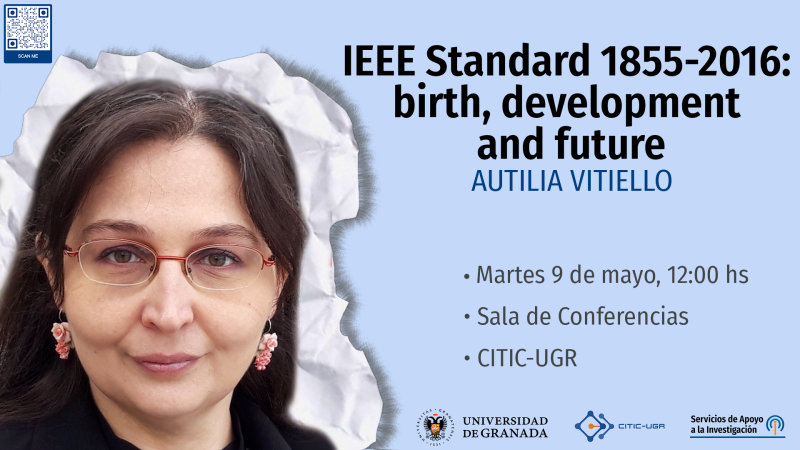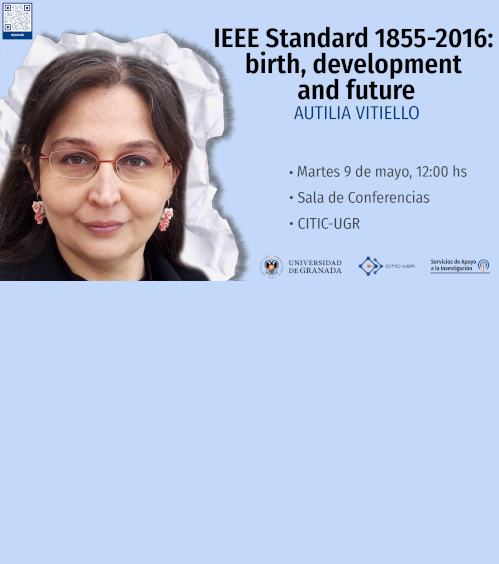

- Ponente: Autilia Vitiello.
- Fecha y hora: martes, 9 de mayo de 2023, a las 12:00 horas.
- Lugar: Sala de Conferencias del CITIC-UGR.
- Organiza: Centro de Investigación en Tecnologías de la Información y las Comunicaciones de la Universidad de Granada (CITIC-UGR).
- Contacto: José Manuel Soto Hidalgo.
Abstract: Historically, fuzzy logic has been widely used to enable designers of industrial controllers and intelligent decision frameworks to model complex systems using simple linguistic rules. Unfortunately, the design task of a fuzzy system can be affected by strong difficulties related to the implementation of the same system on different hardware architectures, each characterized by its own set of electrical/electronic/programming constraints. These difficulties can become very critical when a fuzzy system needs to be deployed in distributed environments populated by a collection of interacting and heterogeneous hardware devices. IEEE Std 1855 aims to bridge the aforementioned implementation gaps by introducing an abstract and unified approach to the design of fuzzy systems. Specifically, the IEEE Std 1855 defines a new language, the Fuzzy Markup Language (FML), which takes advantage of the extensible Markup Language (XML) specifications and related tools to facilitate the modelling of fuzzy logic systems in a human-readable and hardware-independent manner. This talk will discuss IEEE Std 1855, the motivations for its creation, its development, and the current activities aimed at maintaining and updating its features.
Biography: She took a second level (MS) degree cum laude in Computer Science at the University of Salerno (Italy) in July 2009, defending a thesis in "Time Sensitive Fuzzy Agents: formal model and implementation". From November 2009 to October 2012 she attended Ph.D. Program at Dipartimento di Informatica of the University of Salerno under the supervision of Prof. Vincenzo Loia and dr. Giovanni Acampora. Chair of IEEE-SA 2976 Working Group and Member of the Quantum Computing and Smart Systems laboratory (QUASAR) in the Department of Physics “Ettore Pancini” University of Naples Federico II.
Resumen: Históricamente, la lógica difusa se ha utilizado ampliamente para permitir a los diseñadores de controladores industriales y marcos de decisión inteligentes modelar sistemas complejos utilizando reglas lingüísticas sencillas. Por desgracia, la tarea de diseño de un sistema difuso puede verse afectada por fuertes dificultades relacionadas con la implementación del mismo sistema en diferentes arquitecturas de hardware, cada una caracterizada por su propio conjunto de restricciones eléctricas/electrónicas/de programación. Estas dificultades pueden llegar a ser muy críticas cuando un sistema difuso necesita ser desplegado en entornos distribuidos poblados por una colección de dispositivos hardware interactuantes y heterogéneos. La norma IEEE Std 1855 pretende cubrir las lagunas de implementación mencionadas introduciendo un enfoque abstracto y unificado para el diseño de sistemas difusos. En concreto, la norma IEEE Std 1855 define un nuevo lenguaje, el Fuzzy Markup Language (FML), que aprovecha las especificaciones del lenguaje extensible Markup Language (XML) y las herramientas relacionadas para facilitar el modelado de sistemas de lógica difusa de forma legible para el ser humano e independiente del hardware. En esta charla se hablará de la norma IEEE Std 1855, las motivaciones para su creación, su desarrollo y las actividades actuales encaminadas a mantener y actualizar sus características.
Biografía: Se licenció cum laude en Informática por la Universidad de Salerno (Italia) en julio de 2009, defendiendo una tesis sobre " Time Sensitive Fuzzy Agents: formal model and implementation". De noviembre de 2009 a octubre de 2012 cursó el Programa de Doctorado en el Dipartimento di Informatica de la Universidad de Salerno bajo la supervisión del Prof. Vincenzo Loia y el dr. Giovanni Acampora. Presidenta del grupo de trabajo IEEE-SA 2976 y miembro del laboratorio de Informática Cuántica y Sistemas Inteligentes (QUASAR) del Departamento de Física "Ettore Pancini" Universidad de Nápoles Federico II.